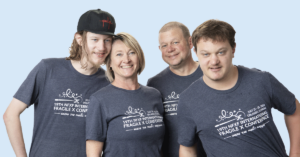About the Study
Who can participate?
The study team is looking for individuals of any sex with Fragile X syndrome, autism spectrum disorder, the Fragile X Premutation, or individuals without these conditions.
What will happen in the study?
If the individual qualifies and decides to be in this research study, they will first complete the remote portion of our testing battery. We will ship all necessary equipment to participants and complete a maximum of three hours testing virtually.
Next, the participant will either travel to our lab in Evanston, IL or we will schedule a house visit to complete the remainder of our testing battery in person. This session should be a maximum of 3.5 hours.
You will be asked to complete the following activities:
- A remote assessment: Remote participation involves completing different language tasks, telling a story, solving puzzles, and answering questions.
- An in-person assessment: In-person tasks will involve answering questions, playing games, and listening to sounds. For the listening task, we will have you sit with three electrodes attached to you, one on the top of your head, one on your forehead, and one on your earlobe. The electrodes are non-invasive and do not hurt, however they are sticky, and the task requires you to sit still for about an hour.
- A developmental phone interview
- Questionnaires about yourself
- A blood draw
What are the good things that can happen from this research?
You are not likely to receive any direct benefit from being in this research study. Results from this study may lead to a better understanding of the role of the fragile X gene in complex language and related traits. It is therefore possible that results of this study may aid in treatment and intervention strategies for people with Fragile X in the future.
What are the bad things that can happen from this research?
Your participation in this study may involve the following risks:
- Feelings of fatigue may occur during tasks, you may rest at any time.
- Blood draw: normal pain or discomfort and/or dizziness could occur after the draw, also this information could become part of your medical history if you see your family doctor.
- The gel used to put the discs on your head during the EEG task may be sticky or scratchy.
- There is a risk of breach of confidentiality.
There may be other risks that we do not know about yet. You should report any problems to the researchers.
Will I or my child be paid to complete this study?
Participants will be paid up to ~$110, depending on the number of tasks they complete. Each task is assigned a specific monetary value based on how long and strenuous the task is. Travel reimbursement is also available to families that travel to our lab, based on the miles they travel and the current mileage rate.


